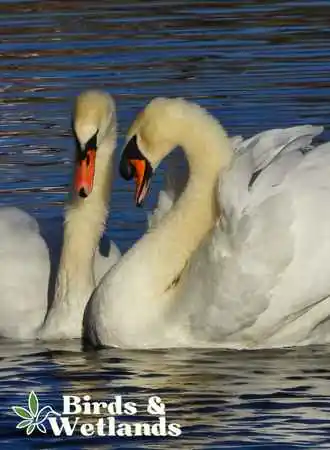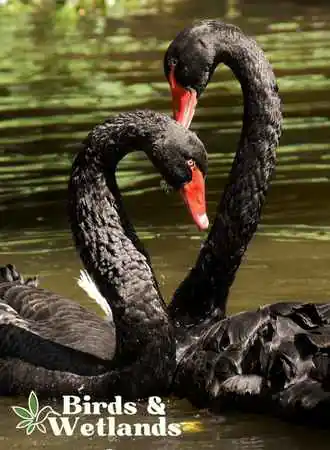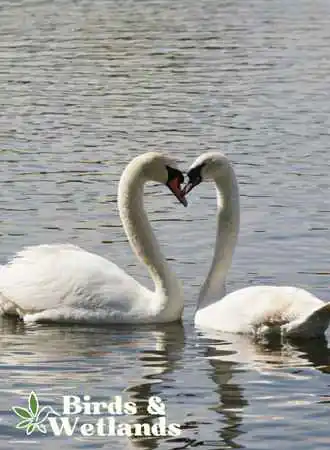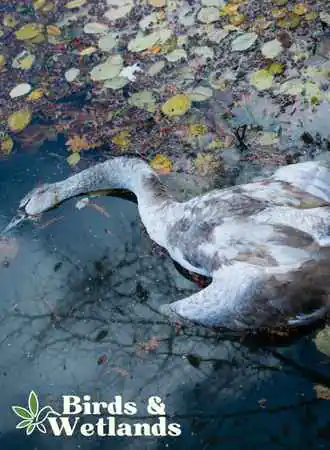Two swans have long been symbols of lifelong pair bonds, often depicted with their long necks entwined to form a symmetrical heart. These majestic birds are known for their grace and beauty, but their commitment to their mates truly sets them apart.
If you’re interested in learning more about these fascinating creatures and their unique mating habits, keep reading! In this post, we’ll delve deeper into the world of swan pair bonding, exploring everything from the courtship displays of swans to how they care for their young.
Contrary to popular belief, not all swans mate for life. However, most swans are monogamous, forming strong, lifelong pair bonds with their mates.
Key Takeaways on Swans Mating for Life
- Swans mate for life and form monogamous relationships. A breeding pair of swans will remain faithful to their partner through thick and thin.
- Like other bird species, a swan may seek a new partner when the other partner dies.
- Some swans cheat on their partners, and swan divorce exists.
Do swans mate for life?
While some birds, such as the bald eagles, sandhill cranes and black vultures, swans have become the universal symbol of romantic and social monogamy.
Mute Swans
Mute swans mate for life. However, if one pair member dies, the surviving swan often finds a new mate.
Mute swans typically form their pair bonds when they are about three years old and begin breeding when they are about four or five years old.
The male mute swan, or cob, and the female mute swan, or pen, engage in elaborate displays, including displaying and vocalizing, to attract a passing female. Once they have bonded, they work together to build a nest and raise their young.
Mute swans are monogamous birds and typically only have one mate at a time.

Trumpeter Swans
Trumpeter swans mate for life, creating powerful lifetime bonds with their partners. Bonding begins between the male and the female in late winter and continues throughout fertilization and egg incubation.
These birds remain devoted to their mates throughout the nesting process and build longstanding bonds even after their chicks leave.
Although some trumpeter swans may find a different mate if the other trumpeter swan dies, they will stay loyal to one another for up to two decades or longer. It has been known for trumpeter swans to die from a broken heart their bonds are that powerful.
Trumpeter swans mate for life and make strong pairs that last many years. During migration, couples will their breeding grounds together to migrate south. They may travel with other swans and birds but return to the same place with the same partner.
Tundra Swans
Tundra swans are known for being monogamous and mating for life. Even though they form strong, lifelong bonds with their mates, certain events can still lead them to change partners.
However, death is the most common cause of a tundra swan couple breaking up. If one of the swans dies, its mate will often find another partner, but there have also been known cases of pairs that remain together until death takes both away, many swans can fade away (some call it a form of suicide, once their mate dies).
A low survival rate also affects their tendency to stay within the same pairing because only 70-75% of juvenile tundra swans ever reach maturity.
Australian Black Swans
Australian black swans usually mate for life, but this is not always true. On average, males tend to be very loyal to their mates, but there have been cases of particularly unfaithful males. But it’s also unheard of for female Australian black swans to cheat on their partners.
Some signs of monogamous behavior include establishing a territory as a couple and sharing responsibilities between the male and female swan partners. This is interesting because Australian black swans have very high courtship scores compared to other species.
Swans eat aquatic plants, insects, small fish and invertebrates. Paired birds mate and form monogamous pair bonds and will hunt together to access food sources, build nests, and raise young until they can survive independently.

Do swans engage in courtship rituals?
Like other birds, swans engage in courtship displays. These rituals vary depending on the species of swan, but many swans perform elaborate courtship displays to attract a mate. These displays include head bobbing, mating dance and synchronized swimming.
These rituals of the male swan aim to attract a mate and establish a pair bond, which is necessary for the swans to breed and raise offspring. Once swans choose their mate, they stay together until one of them dies.

Do swans divorce their partners?
One of the most interesting swan facts that you have never heard of is the existence of swan divorce. Swan divorce is a rare but documented phenomenon and can occur in several circumstances.
One of the most common instances is when one mate deserts the other and, upon returning to the spring breeding site, has found another partner. This situation can lead to the deserted swan feeling abandoned and seeking solace in another mate.
In other cases, both male and female swans that breed successfully may abandon their current mates for unknown reasons, though it has been speculated that this could be due to illness, old age or simply a lack of compatibility between them.
It has also been observed that some swans may become disinterested in their existing partner after spending too much time together or as they age and evolve into different personalities than they had when they first paired up.
Another possible reason swan pairs break up is a poor breeding season and nest failure during the mating season. Swans breed once a year. If one of the pairs can’t breed for some reason, the other pair will look for another mate to copulate with.
Do swans get a sexually transmitted disease?
Some swans cheat on their partners and can contract sexually transmitted diseases. For instance, it has been observed that a female Australian black swan may be promiscuous and cheat on the male black swan, having multiple mating partners at one time and possibly transmitting infections among them. Therefore, some swan species could, in fact, carry and transmit such diseases.

What happens when a swan mate dies?
Swans mourn the death of the former mate. The surviving swan may go through a period of mourning and may become more aggressive when protecting its breeding territory. It may also actively search for a new mate.
Swan relationships are generally monogamous, and pairs often mate for life, so the loss of a mate can be a significant event for a swan. However, swans are resilient birds and can adapt to changes in their environment and social structure.
Some swans may eventually form new mating pairs if their original mate dies. For example, female mute swans can find a new mate instantly when the other mates die.



